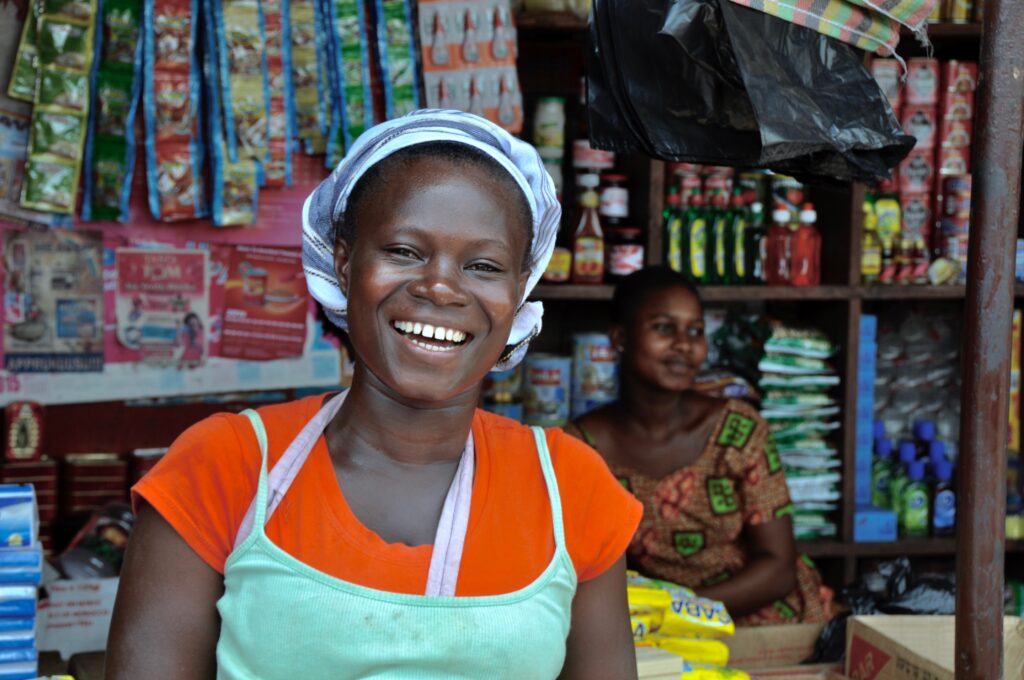Driving Resilience and Adaptation through a Mastercard Foundation and Pyxera Global Partnership
Overview
In collaboration with Pyxera Global, the Mastercard Foundation initiated the MSME COVID-19 Recovery and Resilience Program (CRRP) in Ghana to tackle the economic repercussions of COVID-19 on Micro, Small, and Medium Enterprises (MSMEs). The program aimed to boost Ghana’s economy by fortifying the MSME network and enhancing MSMEs’ capacity to revitalize, maintain, and expand their ventures.
Challenge
In 2020, various obstacles due to COVID-19 plagued Ghana’s economy, exposing the disproportionate effect of the pandemic on women-owned [1] and youth-led businesses in peri-urban areas. These businesses typically had limited financial reserves to withstand disruptive events like a pandemic and struggled to access government funds. Furthermore, acquiring finance in Ghana was challenging, with average interest rates spanning from 15 to 30 percent and collateral requirements such as land or home ownership, which many Ghanaian women lacked.
Additional issues confronted women-owned and youth-led businesses, including limited formal education, inadequate or inefficient infrastructure, elevated transportation costs, and restricted access to the internet and smartphones. The digital divide in peri-urban areas necessitated upskilling in areas like digital marketing training and digital literacy.
In light of these systemic deficiencies and the costly, disruptive nature of doing business, MSMEs had to continually adapt to survive and prosper. The program by the Mastercard Foundation and Pyxera Global aimed to assist these businesses in overcoming these challenges and promoting growth in the Ghanaian economy.
Approach
The Mastercard Foundation and Pyxera Global joined forces to support enterprises and entrepreneurs in Ghana during the COVID-19 pandemic. The CRRP aimed to train and mentor over 10,000 MSMEs, facilitate peer-to-peer learning, and employ digital platforms to grant access to professional services and information. The program gave special attention to women-led and youth-led businesses to foster their growth and success.
“I have learned tips to manage my business and mitigate risks in times of crisis so that it doesn’t have an adverse effect on my business. Knowledge obtained from training sessions has enabled me to expand my customer base through online marketing, as this will help ensure my business doesn’t fold up. Coaching helped me realize an additional line of business, and now I am providing door-to-door services as part of the marketing of my new products.”
Betty Asare-Ntow, hairdresser, Cape Coast
Pyxera Global led a consortium of partners (Scale Up Africa, Global Mamas, JA Venture Capital, and MDF West Africa) to supply MSMEs with business management training, coaching, and mentoring, as well as to facilitate access to finance and market linkages. These rapid recovery and resilience interventions augmented MSMEs’ abilities to endure the pandemic.
Outcome
Working with 11,181 MSMEs, the CRRP adopted a tailored approach to optimally serve women and youth-owned businesses in adapting their business models, diversifying their business lines, restoring their operations to pre-COVID levels, and successfully establishing systems to withstand future shocks. As a consequence of the program, these small enterprises remained in business and retained employees during an incredibly challenging financial period. The program achieved other notable successes:
- Strengthening Enterprises and Entrepreneurs – The CRRP trained over 31,000 individuals in business management and coached them in risk mitigation.
- Conserving Value – The participating MSMEs employed 20,000 youths throughout the program.
- Expanding Access to Finance – Consortium partners helped MSMEs access over $500,000 in financing from financial institutions. Additionally, banks used information available on a CRRP online platform to offer Ghanaian businesses opportunities to access credit.
[1] The crisis impacts female-led households disproportionately, with a 58% increase in poverty than about 54% in male-led families, The Economic Impacts of COVID-19 in Ghana
BORGEN MAGAZINE, JULY 3, 2021

